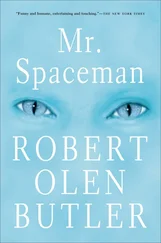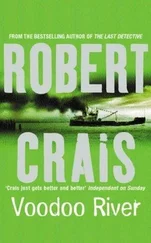Darla stops reading.
She sits up and it is very dark. She and Robert have been living together for less than a week. He is beside her in the bed. She struggles to disentangle her mind from a trivial dream and to animate her sleep-heavy limbs, but her hearing is fully awake and she recognizes a snubbing of sobs in him and then a strangled gasping and then a wrenching in the dark and his body moving. The sounds that woke her dissipate, and only a heavy, trembling breathing remains. She can make out Robert’s body, sitting now, turned with his back to her.
She lifts her hand, hesitates, moves it to him, touches his shoulder.
He starts.
“Sorry,” she whispers.
He stands abruptly.
But he does not move off.
He breathes heavily, and then not at all, and then a little less heavily, making an effort to control himself.
He lies back down.
He does not explain, not even to say he’s had a bad dream.
Not on this night, not ever in the decades to come, does he speak of the nightmares of their first couple of years together.
She’s not supposed to be party to them. But surely she knows them well enough. They are of Vietnam. They are of what he has seen, what he has done.
This first time, he’s been out of the army for barely four months. Is she moved on that night to think of his imperishable valor ? No. Right and wrong are clear to her at age twenty-three: Perhaps he stood against the horrors he faced in Vietnam; perhaps he did not run. But for this to be achieved in service to a cause not only lost but utterly wrong, the act would be stripped of anything she’d call courage. His true valor could be found in his having marched with her against their own government. But in her growing fidelity to Robert Quinlan, when he dreams and awakens to his guilt, to his shame, how is she to help him? He has already done whatever it is he has done. She wrestles with all this and then with a rush she has an answer: His valor, expressed by protesting in the streets of Baton Rouge, is even greater for its first having been challenged and wrecked in this unholy war. The longhairs who duck all that and hide and then prance their own righteousness are not half so brave as he.
Darla blinks her way back to Monticello.
The longhairs. Her father’s phrase.
She does not want to consider her father.
She concentrates on the text of the monument.
Let this mute but eloquent marble testify to the enduring hardness of that living human wall of Florida soldiery that stood during four long years of pitiless war — a barrier between our homes and an invading foe.
She is making a familiar argument to her father. “You talk like Ho Chi Minh is threatening to invade Ithaca and march up our shore and into our parlor,” she says. The two of them are sitting on wicker chairs on their front veranda overlooking Cayuga Lake.
Resisting still, Darla turns from the Confederate monument and walks a few yards away, stops beneath a cabbage palm, its lower fronds burnt brown by last week’s freeze.
Her father is here too.
He’s blathering about the domino theory.
Why does she even bother arguing?
As he goes on, she continues for now to accede to the family tradition for discussions: You at least pretend to look at each other. But she can’t believe he’s insulting her intelligence by spouting this nonsense. Demanding she believe that when Vietnam turns communist it will immediately topple to Chinese control and then Cambodia will fall and then Laos and on and on.
She’s heard enough. She says, “Our country is totally ignorant about who it’s dealing with.” This much she says to his face. She is ready to make the case. But the face is so familiar. Once, she voraciously studied every twitch and glint and moue of it for approval. But now Darla’s First Law of Parental Physics has prevailed: Every obsessive daughterly action to find her identity through her father will eventually result in an equal and opposite reaction. The idea of speaking to this face repulses her. And his eyes make it worse. They are the blue of a clear sky starting to go dim on a late-autumn afternoon. They are her eyes.
So on this day, sitting on the veranda of their upstate Queen Anne with a man who is used to being the patriarchal boss, who won’t listen to reason, who spews the domino theory to justify a country gone mad, she breaks with the family tradition.
She lowers her face a bit without taking her eyes off his, just to signal that what she is about to do is conscious and meaningful, and then she turns her head away. She even shifts her shoulder a little in the same direction, to make both points: She is enlightening him and she is turning her back on him. And then, as if to the forest of hemlock and sugar maple that surrounds their house, she says, “Virtually every city and town in Vietnam has a statue of a hero. They all have one thing in common. They honor Vietnamese heroes who threw the invading Chinese out of their country. It’s preposterous to argue that a unified Vietnam will turn into a puppet state for the Chinese. They have two thousand years of invasion and resistance between them.”
Markus Kallas, Darla’s father, grew up in Hell’s Kitchen. As a teenager he helped his storefront-butcher father create and market a sideline of Estonian blood sausage. As a twenty-three-year-old, with his father’s death, he took over the business. As a thirty-year-old he began making his fortune by canning meat and finding a better way to keep it moist through the heat processing. He is old-country, old-school, and self-made. However, with Darla’s words, Markus Kallas — who finds the showing of strong feelings to be unseemly in such a man as he — even Markus Kallas cannot hide an involuntary softening and beaming in his face. In spite of his daughter’s odd and insulting gesture of talking as if to the trees. She’s not like all the rest of that hippie crowd. She has done her homework. She even has the right kind of backbone, stiffened by study and thought. She is old-school. His political opinion does not change because of her reasoning, for he did not reason himself into the opinion, but his feeling for his daughter, in some fundamental way, does. Moments later he layers over his newly altered feeling with the seemly reserve he is devoted to, though the feeling itself will abide till his death on the Taconic Parkway.
What will abide in Darla, however, is an unaltered feeling about him, for in those few moments she was looking into the trees and she did not see what was briefly evident in his face.
So she returns to the shadow of a cabbage palm four decades later with this thought, directed specifically to her father: After Vietnam was unified it took only three years to prove me right. The first war they fought was in Cambodia, where they kicked out a genocidal communist regime supported by the Chinese. The second war they fought was on their own northern border with the Chinese themselves. You never understood a thing.
The veranda and the house on Cayuga Lake linger in Darla’s head even as she reflexively pulls back from a road tractor wheezing its way past in the traffic circle, its semitrailer stacked with pine tree trunks. She cannot imagine her father’s leaving her the Queen Anne in his will as anything but a ploy. As an effort, even from beyond the grave, to bend her to his will, his way of life, his way of thinking.
The semi is gone. The smell of pine lingers. She rouses herself. She moves back to the Confederate monument. Focus , she thinks. Focus.
Let the young Southron, as he gazes upon this shaft, remember how gloriously Florida’s sons illustrated their sunny land on the red fields of carnage, and how woman — fair and faithful — freshens the glory of their fame.
Читать дальше












